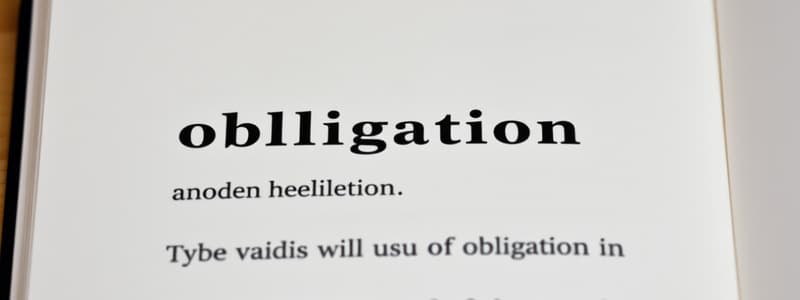Podcast
Questions and Answers
What is the primary difference between 'must' and 'have to' regarding obligation?
What is the primary difference between 'must' and 'have to' regarding obligation?
- 'Have to' implies a less severe obligation than 'must'.
- 'Must' conveys external pressure, while 'have to' is a personal opinion.
- 'Must' indicates a strong personal obligation, while 'have to' refers to an obligation imposed by external circumstances. (correct)
- 'Have to' is used only in informal contexts.
Which of the following sentences correctly uses 'mustn't'?
Which of the following sentences correctly uses 'mustn't'?
- You mustn't play soccer if it rains.
- You mustn't walk on a tightrope unless you're confident.
- You mustn't operate machinery without training. (correct)
- You mustn't breathe underwater without equipment.
When should 'can't' be used instead of 'mustn't'?
When should 'can't' be used instead of 'mustn't'?
- When giving advice against an action.
- When indicating a situation is forbidden.
- When denying someone's ability to do something. (correct)
- When expressing a strong obligation.
In which context is it more appropriate to use 'ought to' instead of 'should'?
In which context is it more appropriate to use 'ought to' instead of 'should'?
What is a primary function of using 'should' when giving advice?
What is a primary function of using 'should' when giving advice?
Which phrase represents a gentle suggestion?
Which phrase represents a gentle suggestion?
In what situation would you most likely use 'have to'?
In what situation would you most likely use 'have to'?
Which of the following is an example of a strong recommendation?
Which of the following is an example of a strong recommendation?
Flashcards are hidden until you start studying
Study Notes
Modals of Obligation, Prohibition, and Advice
Must Vs. Have To
-
Must:
- Indicates a strong obligation or necessity.
- Often used by the speaker to convey their own opinion.
- Example: You must wear a seatbelt. (personal obligation)
-
Have To:
- Indicates an obligation imposed by external circumstances.
- Used for rules, laws, or external pressure.
- Example: I have to submit the report by Friday. (external requirement)
Mustn't Vs. Can't
-
Mustn't:
- Indicates prohibition; something is forbidden.
- Example: You mustn't smoke in here. (strong prohibition)
-
Can't:
- Indicates inability or impossibility.
- Can also express prohibition but often from a logical standpoint.
- Example: You can't go to the party if you're sick. (logical impossibility)
Should Vs. Ought To
-
Should:
- Suggests a recommendation or advice.
- Can imply a moral obligation.
- Example: You should see a doctor if you're feeling unwell.
-
Ought To:
- Similar to should but often carries a slightly stronger moral implication.
- Example: You ought to apologize for your mistake.
Expressing Advice
-
Use of modals:
- Should and Ought To are both commonly used for giving advice.
- Example: You should try meditation for stress relief.
- Example: You ought to consider your options carefully.
-
Other expressions:
- It's a good idea to...: Suggesting a positive action.
- Example: It's a good idea to start saving early.
- You might want to...: Polite suggestion.
- Example: You might want to check the weather before leaving.
- It's a good idea to...: Suggesting a positive action.
-
Tone of advice can vary:
- Strong advice: "You must..."
- Gentle suggestion: "You may want to..."
Modals of Obligation, Prohibition, and Advice
- Must indicates a strong personal obligation or necessity; reflects the speaker's opinion.
- Have To signifies obligations resulting from external circumstances, such as rules or laws.
- Mustn't expresses strong prohibition, indicating that something is forbidden.
- Can't denotes inability or impossibility; often implies prohibition from a logical perspective.
Should Vs. Ought To
- Should suggests advice or recommendations and can imply moral obligation.
- Ought To is similar to should but carries a heavier moral weight, indicating stronger advice.
Expressing Advice
- Should and Ought To are commonly used for giving advice, with examples highlighting recommended actions.
- Other phrases:
- It's a good idea to... encourages positive actions.
- You might want to... offers a polite suggestion.
- The tone of advice can range from strong ("You must...") to gentle ("You may want to...").
Studying That Suits You
Use AI to generate personalized quizzes and flashcards to suit your learning preferences.




